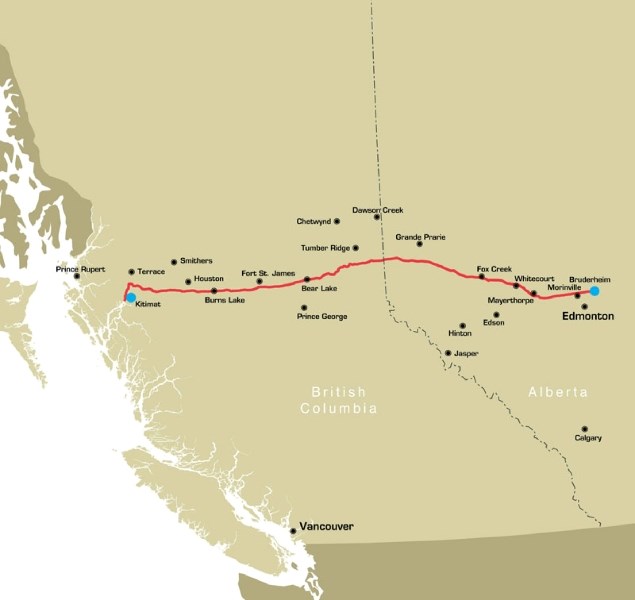A local First Nation plans to oppose a $5.5 billion trans-provincial pipeline due to the risks it presents to its traditional lands.
Enbridge Pipeline has filed an application to build the Northern Gateway Project, a pair of pipelines that would ship Alberta oil to B.C. ports. If built, the 1,177-kilometre pipelines would run through Sturgeon County and Alexander First Nation, passing within a few kilometres of Morinville, Bon Accord and Gibbons along the way.
The federal Joint Review Panel ordered a hearing on the project on May 5 to assess its effects on the environment and the public interest, and is now looking for interveners. Morinville town council heard a presentation on the project from its proponents at its regular meeting last week.
This project will bring about $27 million in investment to the Edmonton region, said Enbridge spokesperson Marnie Yohemas, and employ up to 3,000 people in B.C. and Alberta during construction. "These workers will be eating at your restaurants, sleeping at your hotels, filling their vehicles at your gas stations and spending their money in your community."
But it also brings environmental risks, such as oil spills. That risk has triggered fierce opposition to the pipeline from environmental and aboriginal groups, including Alexander First Nation.
This project could affect wildlife throughout the reserve's traditional lands, says Chief Allan Paul, and could cause an oil spill in the middle of the band's lands near Fox Creek. "We don't have the infrastructure in case of a spill," he said. "They're telling us to support it with very little information."
The case for
The project would consist of two pipes, Yohemas said — one for oil, one for condensate — buried about a metre underground. If built, the first pipe would shuttle about 525,000 barrels of oil a day from Bruderheim, Alta., to Kitimat, B.C., for shipment overseas by tanker. About 193,000 barrels of condensate a day would travel back along the second pipe.
"The market [for oil] in the United States is flat at best," Yohemas said. "It's not growing."
Unless Canada wants to sell its oil at a discount, it needs to tap into energy-hungry markets across the Pacific.
The project should create about 1,150 long-term jobs in Canada, Yohemas said, about 379 of which would be in Alberta. It will also add about $68 million in wages to the economy a year.
Enbridge has had spills from its pipelines in the past, she noted — millions of litres of oil spilled into a tributary of Michigan's Kalamazoo River last July after one such incident. "No spill is acceptable to Enbridge," she said, and the company would have extensive safety measures such as continuous monitoring to prevent a similar accident on this line.
Opposition to the project is significant, she said, especially in western B.C. "We'd like to hear our friends as well."
She encouraged supporters and critics of the project to register to present evidence, speak or write to the project's Joint Review Panel over the next few weeks.
Ambivalence and opposition
Alberta definitely has to grow its oil market beyond the United States, said Coun. David Pattison. "Somebody's going to supply China. Somebody's going to supply India. Let it be us."
Town council has yet to decide if it will get involved in the hearing, said Mayor Lloyd Bertschi. "Having an oil pipeline [there] doesn't pose any significant stress to myself," he said, as Alberta already has a lot of them. This one would also follow the existing Alliance natural gas pipeline.
A west-coast pipeline would be a prudent move for Alberta's economy, he continued. "Some of the numbers they're throwing around from an economic standpoint are enormous."
Sturgeon County has not taken a formal position on the project, said Mayor Don Rigney.
Alexander is concerned about the pipeline's footprint, Paul said, and plans to apply for full intervener status in the upcoming hearing. "We are the most impacted First Nation on that pipeline route," he said. "We need to fully understand what the social and economic impact will be in that area."
Maps of the proposed route for the pipelines suggest that they would pass through Alexander's lands near Fox Creek and within a kilometre of its lands in Sturgeon County. In the process, Paul said, the line would run through about 1,900 acres (769 hectares) of land set to be added to Alexander in the future under the 1998 Treaty Land Entitlement Settlement Agreement.
The deadline to register for the hearing is July 14, Yohemas said. Community hearings are expected to start next Jan. 10, with the pipeline, if approved, starting operation in 2017.
The Joint Review Panel will hold an information session on the hearing process in Bruderheim June 6. For details, visit gatewaypanel.review.gc.ca.




